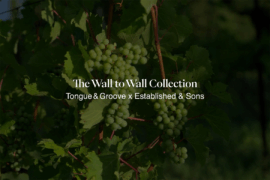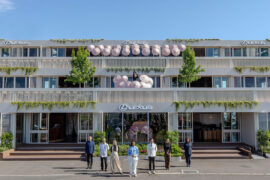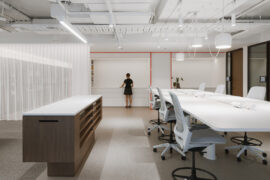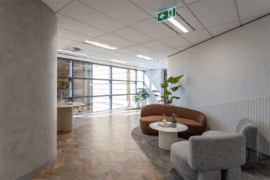Brent Harman of thinkMESH talks commercial real estate, challenging the status quo, and building stronger business communities with tech.
What does disruption really mean? That was the question on our minds when we caught up thinkMESH founder and FRONT Featured Speaker Brent Harman in the lead up to the “Tech Two and Call Me in the Morning” session at the inaugural FRONT event. Read on for Brent’s thoughts on commercial real estate, challenging the status quo, and building stronger business communities with tech.
Read more interviews in this series here and register for FRONT today.
Brent Harman: I’m a land economist, and I was trained to see property as an asset whose capital value you try to increase to derive an income. For my first couple of jobs I was actually working for occupiers, and for them, property was definitely not something that they wanted to increase the capital value of: they didn’t want to increase the amount of rent they paid.
Over time what I discovered was this really wonderful opportunity – property is the second or third biggest cost in organisations, and I was intrigued by getting to know businesses and what made them tick and trying to find property solutions that not just saved them money but actually had a material impact on the business. And I’ve spent my whole career doing that. I’m really anti-status quo – I find the status quo boring – so try to always be disruptive and question why things are done.
In terms of my career, I spent six and a bit years at Fairfax, who I guess are the stereotypical disruptee. They definitely had a burning platform and we took a project to the CEO that was all about changing the work environment so by saying that people were ‘digital first’ they didn’t just get a different job title – they actually changed the environment they were in. What we did, essentially, was we went digital and saved money by helping people at Fairfax learn how to be successful in this new environment.
This was a form of ABW (activity based working), and being a media company it was a solution that matched the problem. I used property to help Fairfax transition from a traditional media company to a digital media company: everyone got laptops, every meeting room had a camera and a screen… we won a Global Innovation Award [of the International News Media Association] for that, which was great.
Then I got headhunted to go to Atlassian, where I was the Global Head of Experience and Real Estate. The thing that attracted me to Atlassian – which back in those days wasn’t a household name – was that I was reporting to the Chief People Officer, or Chief HR Officer. For me, having reported to CEOs and CFOs, it’s all about the people and the people that make up the business. I was at Atlassian for four years and I was responsible for creating a really wonderful work experience for our staff.
We Won Australia’s best place to work twice, won [a similar award] in the Netherlands twice, and in Asia twice… and we scaled from circa 400 to 2000 people and went public and the culture remained intact, so that was a great ride. I left because I was also a co-founder of TechSydney and the more time I had with entrepreneurs and start ups, the more intoxicated I got by it. I saw an opportunity to create a more efficient marketplace for commercial property, which I think is overly adversarial and terribly inefficient, and that’s where ThinkMESH came from.
ThinkMESH is all about creating a more efficient market, but it’s not as cold as that. I believe the future of work will be about community and reciprocity; the companies that are going to win the future of business will be the ones that are able to partner with organisations to achieve their goals. Fairfax is a good example of that. They’re coming out of the other side of the disruption and they’re much smaller now, but they also own 50 per cent of Stan with Channel 9 – they have a lot of strategic partnerships and alliances. And I believe that’s the future of business.
The work environment can be used to help with all of that. Currently, I’m working on a project where we’re creating a tech community and we’re actually curating who the tenants are and ensuring that their values and business goals are complementary. Instead of putting a property person in charge of the building, we’re putting someone who has credibility in the tech space in charge of it, so what we’re doing is managing the environment in a true sense.
I think the reason Atlassian has won so many awards is because we spent just as much time thinking about the social, cultural, and business elements of the environment, so that the environment is so much more than the physical. If you can align all those different elements that’s when the magic happens, and commercial office buildings can become communities of like-minded companies.
I’m also working on a piece of software that will enable landlords and tenants to engage and transact in a way that’s more about partnering and less adversarial than the current model – that democratises information. At the moment, most information in the market is held by certain groups of people who then trade on that information for profit.
Whereas our current generation just isn’t used to that: they’re used to information being readily available on the Internet, and the people who are successful are the people who can make sense of that information. So you’re going to end up with a more efficient market if you can get people together and talking earlier in the process, and they can then all be informed about the relevant information in the market.
I’m also a firm believer that we’re in the early stages of Industrial Revolution Four. Industrial Revolution One being steam, Two being electricity and the rise of mass production, and Three being the digital revolution. I think number Four is going to have the most profound impact on humanity and is going to be artificial intelligence and ‘the internet of things’, which will impact all of us more than anyone even realises. I think the whole concept of community and reciprocity will bubble to the surface, and I just want to get out in front of it.
The Australian property industry is really safe and secure, but I wouldn’t say that it’s innovative. My experience to date has been that I’m very much leading, and so picking the right client is very important. Change is hard and change without really clear client management is impossible. The interesting thing is the cost of not [changing]: people don’t see that yet but it’s my belief that banks will have half the headcount that they do now in maybe seven to ten years time.
Yeah, and I think more of their staff will become contractors. If you look at the top ten companies by value in the US, four of them are less than 15 years old. The youngest [top ten company by value] we have in Australia is Telstra – and that’s cheating a bit because they used to be part of the government – and four of them are banks. So from a property point of view, banks occupy a lot of property and it’s inevitable that they will get disrupted.
They’ve done a great job at reducing and maintaining their margins by cutting cost and becoming more efficient but there are really only two things are going to shift the dial: people and technology. We need to think about the effect on our economy of the banks becoming smaller, and the effect of this on property. And this is going to happen in every industry.
What we’ve seen with Fairfax and media is just the start: it’s going to happen everywhere. I think Mike Cannon-Brookes [Atlassian co-founder] said this: there are two types of companies. There are software companies and there are companies that want to become software companies. Software is truly eating the world, and that has a natural impact on people and the way that people do business.
Communities need to be curated. I think getting the right companies together – that have similar values or business outcomes – is important. Companies need to be willing to be open and recognise that they’ll achieve the best outcomes for their business by partnering with others.
Putting those people in the same building will amplify that. I think getting the right companies together and making sure they’re a good values fit is important, and so is managing and curating the environment. When I say environment I don’t mean just the physical: I mean investing and caring as much about the cultural, about the social, and about the business-to-business connections.
Reciprocity stems from partnering, and is a new way of doing business. If you look at companies that are less than ten or fifteen years old, they’re more values-driven in their behaviour, not just in their words, and so are very active in liberal movements and have a social conscience.
But for older organisations, it’s more of, “Why would I do that?” There’s actually a book called The Reciprocity Advantage that explains the whole concept, and I think this will bubble to the surface because of the changing environment.
I think it goes on a case-by-case basis. But firstly – ‘agile’ is a method for producing software. It’s not a way of working! ABW, though, I can live with that. I think it’s just whatever is right for the business. I will be controversial and say that I think that the way projects are completed is fundamentally flawed and broken in Australia and globally, where you get a designer to go in for a four-day briefing session with everyone and say, “I’m going to get to know your business and do some interviews and then I’m going to go away and with my interpretation create the physical manifestation of who you are as an organisation.”
That’s fine for a company that’s growing at three per cent a year, but when you think about it what you actually get is a testament to the past.
Modern companies are growing and dying at such a fast pace, and so if you get someone to try to get to know your business in four days and interpret that into the built environment and then build it, it all takes twelve months. And by the time you get there it’s twelve months old – at somewhere like Atlassian, about half the people in the space wouldn’t have even been at the organisation.
So instead of being a real springboard to future success that can help a business gain momentum, it becomes a testament to the past and where they’ve come from. I think we need to get used to the fact that it’s not about creating spaces that are beautiful to look at. There definitely should be parts that are beautiful to look at, but it’s about providing spaces that are functional for the users and reduce friction for how they do business.
I think a higher rate of adoption and a willingness to disrupt ourselves; if we don’t do it, someone else is going to. I always used to say to my team when we used to review plans and fitouts: “Show me the 20 per cent that makes you nervous. Show me the 20 per cent that makes you feel – you know the feeling when you lose your wallet? Show me the 20 per cent that makes you feel like that, because that’s where the innovation’s going to be.” I try to do that every day – make myself uncomfortable by pushing boundaries – and I think as an industry we need to keep doing that.
We’ve been really good in this country in terms of being at the forefront of ABW and that sort of thing, but the issue is that everyone’s got a solution and they go shopping for a problem. This is instead of saying, “Actually, I don’t have the solution because I don’t know your business, and I’m going to get to know your business and I’m going to iteratively get there. The truth is, nobody has the right answer for your business at the moment because it’s changing so fast and no one knows your business.” More of that honesty and that willingness to do things differently would be great.
Join Brent Harman and other key industry disruptors at FRONT this 9-10 August to hear more about the ideas that are challenging the commercial design status quo.
Brent will be speaking as part of the “Tech Two and Call Me in the Morning” session on Thursday, 9 August. Register for the session and the inaugural FRONT event here.
INDESIGN is on instagram
Follow @indesignlive
A searchable and comprehensive guide for specifying leading products and their suppliers
Keep up to date with the latest and greatest from our industry BFF's!

For those who appreciate form as much as function, Gaggenau’s latest induction innovation delivers sculpted precision and effortless flexibility, disappearing seamlessly into the surface when not in use.

From the spark of an idea on the page to the launch of new pieces in a showroom is a journey every aspiring industrial and furnishing designer imagines making.

For a closer look behind the creative process, watch this video interview with Sebastian Nash, where he explores the making of King Living’s textile range – from fibre choices to design intent.

London-based design duo Raw Edges have joined forces with Established & Sons and Tongue & Groove to introduce Wall to Wall – a hand-stained, “living collection” that transforms parquet flooring into a canvas of colour, pattern, and possibility.

Melbourne interior designer Brahman Perera creates three-level trackside space exploring synthesis of craft and technology.

GEYER VALMONT is launching an innovation hub designed to improve existing interior design capability through enhanced ways of working and industry-leading technology products.
The internet never sleeps! Here's the stuff you might have missed

A thoughtful, low-waste redesign by PMG Group in collaboration with Goodman has transformed a dated office into a calm, contemporary workspace featuring a coastal-inspired palette and Milliken flooring for a refined finish.

It’s designed for how you live, not just for how it looks.